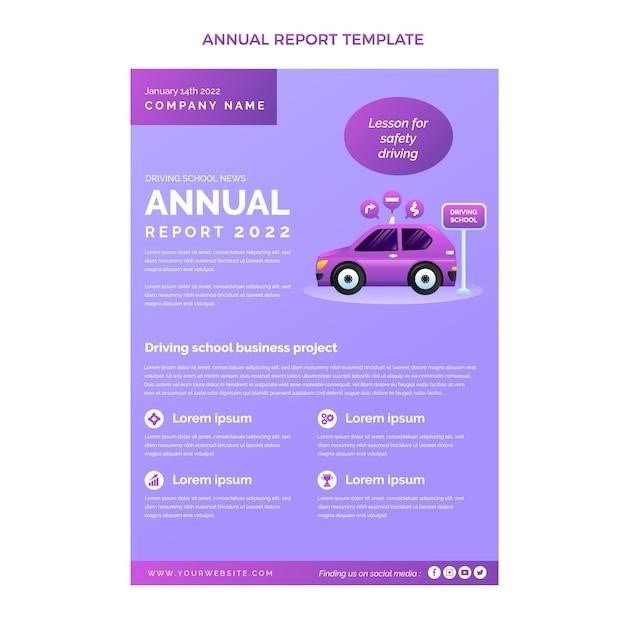
manual oficial para licencias de conducir de florida 2024 pdf
Obtaining a Florida Driver’s License in 2024
The Florida Department of Highway Safety and Motor Vehicles (FLHSMV) provides a comprehensive driver’s handbook, available as a PDF download online, to guide new drivers through the licensing process. This manual covers all aspects of obtaining a Florida driver’s license, including written and driving tests.
The Official Florida Driver’s Handbook
The official Florida Driver’s License Handbook, a crucial resource for prospective drivers, is published by the Florida Department of Highway Safety and Motor Vehicles (FLHSMV). This comprehensive guide serves as the primary study material for the state’s Class E Knowledge Exam, a prerequisite for obtaining a driver’s license. The handbook is readily available as a free PDF download from the FLHSMV website, offering convenient access to all aspiring drivers. Its content encompasses a wide array of topics, including Florida’s traffic laws, road signs and markings, safe driving techniques, and emergency procedures. Thorough study of this handbook is essential for successful completion of the written knowledge test and ensures a strong foundation for safe driving practices. Many third-party resources, such as study guides and practice tests, complement the handbook, enhancing preparation for the exam. The handbook’s detailed explanations and clear illustrations aid in understanding complex traffic regulations and safe driving strategies. Remember to always refer to the official handbook for the most accurate and up-to-date information.
Accessing the PDF Version Online
The Florida Department of Highway Safety and Motor Vehicles (FLHSMV) makes the official Florida Driver’s Handbook readily accessible online as a PDF. This digital version eliminates the need for physical copies, offering convenience and immediate access to all necessary information. To obtain the PDF, simply navigate to the official FLHSMV website. The website’s intuitive design and clear navigation ensure easy location of the downloadable handbook. Once located, click the link to download the PDF version directly to your computer or mobile device. This allows for easy studying and review at any time, anywhere. The PDF format is compatible with most devices, enabling convenient access for all drivers-to-be. The FLHSMV regularly updates the handbook, so downloading the most recent version is crucial for accurate study material. This ensures that all information reflects the current Florida driving laws and regulations. Always double-check the publication date to ensure you are using the most up-to-date version for test preparation.
Key Sections of the Handbook⁚ Road Rules and Signs
The Florida Driver’s Handbook dedicates significant portions to Florida’s specific road rules and traffic signs. Understanding these is critical for passing the written knowledge test and, more importantly, for safe driving. The handbook thoroughly explains right-of-way rules at intersections, merging procedures, and the proper use of turn signals and lane changes. It provides detailed descriptions and illustrations of various traffic signs, categorizing them by shape and color for easy identification. Mastering the meaning of these signs is essential, as the knowledge test often includes questions on their interpretation. Furthermore, the handbook covers rules specific to Florida, such as those pertaining to toll roads, highway driving, and the state’s unique traffic laws. Thorough study of this section will equip prospective drivers with the knowledge needed to navigate Florida roadways safely and legally. Pay close attention to sections outlining speed limits, parking regulations, and the rules governing intersections and multi-lane roadways. Remember, understanding these rules is not only essential for the test but crucial for safe and responsible driving.
Understanding Florida’s Driving Laws
The official Florida Driver’s Handbook provides a crucial overview of the state’s driving regulations, going beyond simple road rules and delving into the legal aspects of operating a vehicle in Florida. This section clarifies the legal ramifications of traffic violations, explaining the different types of offenses and their corresponding penalties, including fines, points on one’s driving record, and potential license suspension or revocation. It details the legal requirements for vehicle registration and insurance, emphasizing the importance of carrying proof of both while driving. Furthermore, it addresses specific laws concerning alcohol and drug impairment, outlining the legal blood alcohol content (BAC) limits and the severe consequences of driving under the influence. Understanding these laws is paramount not only for passing the driving test but also for responsible and lawful driving practices. The handbook also explains procedures for dealing with traffic accidents, including reporting requirements and the steps to take to protect oneself and others involved. This detailed legal framework ensures that drivers are fully aware of their responsibilities and the potential consequences of non-compliance.
Preparing for the Florida Driver’s License Exam
Thorough preparation is key to success on Florida’s driver’s license exam. The official handbook provides essential study materials covering road rules, signs, and driving laws. Practice tests are readily available online to assess your readiness.
The Written Knowledge Test⁚ Content and Format
The Florida Class E Knowledge Exam, a crucial step in obtaining your driver’s license, consists of 50 multiple-choice questions. These questions assess your understanding of Florida’s traffic laws, safe driving practices, and the ability to identify various traffic controls. A passing score requires correctly answering at least 40 questions (80%). The test covers a wide range of topics detailed in the official Florida Driver’s Handbook, including right-of-way rules, speed limits, traffic signals, and safe driving techniques in various conditions. Understanding road signs and their meanings is also heavily emphasized. The exam’s format is designed to test your knowledge comprehensively, ensuring you’re prepared for safe driving on Florida roads. Successful completion of this written test paves the way for the practical driving skills test.
Practice Tests and Study Resources
Beyond the official Florida Driver’s Handbook PDF, numerous resources can enhance your preparation for the written knowledge test. Many websites offer free Florida permit practice tests mirroring the actual exam’s format and question types. These online resources provide valuable experience in answering multiple-choice questions under timed conditions. Several commercially available study guides offer additional practice questions and explanations, often incorporating the latest updates to Florida traffic laws. Mobile apps are another convenient option, allowing you to study on the go. Remember, consistent practice is key to success. By combining study from the official handbook with practice tests, you can effectively identify areas needing further review and improve your chances of passing the exam on your first attempt. Don’t underestimate the value of consistent study and practice.
Scheduling Your Driving Test
Once you’ve successfully passed the written knowledge exam, the next step is scheduling your road test. The Florida Department of Highway Safety and Motor Vehicles (FLHSMV) website is your primary resource for scheduling. You’ll need to create an online account or log in if you already have one. The system allows you to select your preferred testing location and date/time based on availability. Remember to check for any specific requirements or documentation needed for the driving test; this information is usually detailed on the FLHSMV website. It is advisable to schedule your test well in advance, particularly during peak seasons, to secure your preferred time slot; Be sure to arrive at the testing center at least 15 minutes early with all necessary documents and your vehicle in good operating condition. Thorough preparation will minimize stress and maximize your chances of success.

Specific Requirements for Florida Drivers
Florida’s driver’s license requirements include age restrictions, residency stipulations, and completion of a Traffic Law and Substance Abuse Education (TLSAE) course. Learner’s permits have specific restrictions on driving times and passenger limitations.
Learner’s Permits and Restrictions
In Florida, a learner’s permit, also known as a restricted license, allows 15-year-olds to begin the driving process. However, this permit comes with significant restrictions. The most important is the requirement of a licensed driver, aged 21 or older, to be seated in the front passenger seat at all times while the permit holder is driving. This ensures supervision and guidance during the learning phase. Additionally, nighttime driving is generally prohibited for new drivers during the initial months following license acquisition; exact timeframes vary, but restrictions often extend to driving between 10 p.m. and 6 a.m. These restrictions are designed to prioritize safety and provide additional experience before granting full driving privileges. The Florida driver’s handbook details these restrictions and others that new drivers should be aware of, highlighting the importance of responsible and safe driving practices. Adherence to these rules is crucial for both the safety of the learner and other road users. The handbook provides further clarification on these rules and other important information for new drivers in the state of Florida.
Traffic Law and Substance Abuse Education (TLSAE)
Florida mandates completion of a Traffic Law and Substance Abuse Education (TLSAE) course, often referred to as DATA (Drugs, Alcohol, Traffic Awareness), for all first-time drivers, regardless of age. This course is a prerequisite for obtaining either a learner’s permit or a driver’s license. The TLSAE program aims to educate new drivers about the dangers of driving under the influence of alcohol or drugs, as well as the importance of obeying traffic laws. Successful completion of this course is crucial, as it’s a necessary step in the licensing process. Upon completion, the information is automatically submitted to the Florida Department of Highway Safety and Motor Vehicles (FLHSMV), making it readily available at all driver’s license offices. The course covers various topics related to responsible driving and the legal consequences of driving infractions. Details about approved TLSAE providers and course content are available within the official Florida driver’s handbook, a valuable resource for anyone seeking to obtain a Florida driver’s license. The handbook provides information on locating and registering for these courses.
Residency Requirements for Obtaining a License
Florida law requires all residents to obtain a Florida driver’s license within 30 days of establishing residency. Determining residency can sometimes be complex. The official Florida driver’s handbook clarifies the criteria used to define residency, offering guidance on factors such as enrollment in public schools, employment status, and the location of primary residence. Failure to obtain a Florida license within the stipulated timeframe after establishing residency can result in penalties. The handbook provides a detailed explanation of what constitutes residency, helping individuals understand their obligations. It’s important to carefully review this section to ensure compliance with Florida law. Understanding these requirements is crucial for anyone moving to Florida and planning to drive. The handbook’s clear explanations aim to prevent misunderstandings and potential legal issues. Individuals unsure of their residency status should consult the handbook or contact the FLHSMV directly for clarification. The consequences of non-compliance can be significant, including fines.
Driving Privileges for Non-Residents
The Florida driver’s handbook details the circumstances under which non-residents may operate a motor vehicle within the state without obtaining a Florida driver’s license. Specific exemptions are outlined, including provisions for individuals temporarily visiting, those employed by the U.S. government on official business operating government vehicles, and students enrolled in Florida educational institutions. Military personnel stationed in Florida may also fall under these exemptions. The handbook clarifies the permissible duration of such driving privileges and any associated conditions. It’s crucial for non-residents to understand the specific regulations to avoid legal complications. The information provided aims to prevent misunderstandings and potential fines. Non-compliance can lead to penalties. The handbook serves as a valuable resource for anyone planning to drive in Florida while holding a valid license from another state or country. This section provides clarity on a frequently asked question, ensuring that those visiting or temporarily residing in Florida are well-informed about their driving rights.

Additional Resources and Information
Beyond the official Florida DMV handbook, numerous third-party study guides and practice materials are available to assist prospective drivers in preparing for their licensing exams. Contacting the Florida DMV directly for assistance is also an option.
Official Florida Department of Highway Safety and Motor Vehicles (FLHSMV) Website
The official FLHSMV website serves as the primary source for all information related to Florida driver’s licenses. This website offers the most up-to-date version of the Florida Driver’s Handbook in PDF format, downloadable for free. It also provides details on scheduling driving tests, understanding Florida’s driving laws, and addressing any questions or concerns regarding the licensing process. The site includes information on learner’s permits, residency requirements, and driving privileges for non-residents, ensuring comprehensive coverage of all aspects of obtaining and maintaining a Florida driver’s license. Navigation is user-friendly, with clear sections dedicated to specific topics, making it easy to find the necessary information quickly and efficiently. The site also features FAQs to answer commonly asked questions, offering a convenient self-service option for resolving common queries. For those needing additional support, contact information is readily available on the website.
Third-Party Study Guides and Practice Materials
While the official Florida Driver’s Handbook is a crucial resource, numerous third-party study guides and practice materials can supplement your preparation for the Florida driver’s license exam. These resources, often available in print and digital formats, offer various approaches to learning the material. Some focus on summarizing key concepts from the handbook, while others provide practice questions and tests mimicking the actual exam format. Many third-party options incorporate interactive elements like flashcards and quizzes to enhance engagement and retention. The availability of different formats caters to diverse learning styles, allowing individuals to choose the methods best suited to their needs. However, it’s essential to remember that while these supplementary materials can be helpful, they should always be used in conjunction with, and not as a replacement for, the official FLHSMV handbook. Always verify information against the official source to ensure accuracy.
Contacting the Florida DMV for Assistance
The Florida Department of Highway Safety and Motor Vehicles (FLHSMV) offers various channels for obtaining assistance related to driver’s licenses. Their official website, www.flhsmv.gov, provides a wealth of information, including FAQs, forms, and contact details. You can find answers to common questions regarding licensing procedures, requirements, and test scheduling. For more personalized support, the FLHSMV offers a telephone helpline, allowing you to speak directly with a representative who can address your specific queries. Additionally, many local driver’s license offices are available for in-person assistance. Their locations and operating hours can be found on the FLHSMV website. Remember to have your personal information ready, such as your driver’s license number or application number, to expedite the process. Utilizing these resources ensures you receive accurate and up-to-date information throughout your licensing journey.






